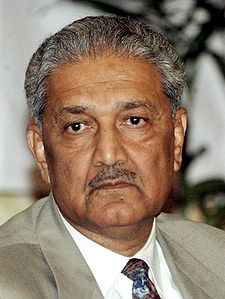.

Abdul Qadeer Khan or A. Q. Khan– Hilal-i-Imtiaz (HI), Nishan-i-Imtiaz (NI) (twice), (Urdu: عبدالقدیر خان; born April 27, 1936 in Bhopal, British India) is a Pakistani nuclear scientist and metallurgical engineer, widely regarded as the founder of Pakistan’s nuclear program. His middle name is occasionally rendered as Quadeer, Qadir or Qadeer, and his given names are usually abbreviated to A.Q. Khan is perhaps better known in much of the world for involvement in acquiring critical nuclear technology designs and using them to build Pakistan’s nuclear arsenal, as well as selling this technology to Libya, Iran and North Korea. Some of his critics have described him as the “Klaus Fuchs of Pakistan”.
In an August 23, 2005 interview with Kyodo News General Pervez Musharraf confirmed that Khan had supplied gas centrifuges and gas centrifuge parts to North Korea and, possibly, an amount of uranium hexafluoride.
In interviews from May through July 2008, Khan recanted his previous confession of his involvement with Iran and North Korea. He said President Pervez Musharraf forced him to be a “scapegoat” for the “national interest. Khan accuses the Pakistan Army and President Musharraf of proliferating nuclear arms. He said centrifuges were sent from Pakistan in a North Korean plane loaded under the supervision of Pakistani security officials. He also said that he had traveled to North Korea in 1999 with a Pakistani Army general to buy shoulder-launched missiles from the government there.
Islamabad High Court on February 6, 2009 declared Dr. A. Q. Khan as a free citizen of Pakistan with freedom of movement inside the country. The verdict was rendered by Chief Justice Sardar Muhammad Aslam. In September 2009, expressing concerns over the Lahore High Court’s decision to end all security restrictions on Khan, the United States has warned that Dr.Khan still remains a serious proliferation risk.









